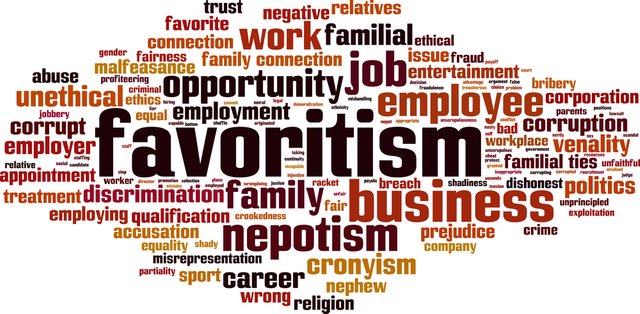How to Avoid Favoritism at Work
Favoritism is the practice of exerting partial or complete control over the decisions made by others. Favoritism can also be shown in rewarding, honoring, or granting contracts to some people over other people. Favoritism was a frequent complaint in government service as well as in business. Cronyism, on the other hand, is a much more specific type of favoritism, relating only to favoritism towards family members.

Two incidents in Separate California court cases illustrate the pervasiveness of favoritism. In the first, according to the gossip blog The Gloss, Tom Dempsey, the former head chef at Saks Fifth Avenue, was sued for allegedly giving preferential treatment to some of his store's female employees in violation of anti-discrimination laws. In the second incident, according to The Gloss, there was an internal investigation at Disneyland Resort for allegedly favoring white applicants over Asian applicants in some positions. Both incidents raise questions as to whether a general tendency toward favoritism exists at major corporations like Disney.
Favoritism and cronyism are often used as a way to motivate employees. Sometimes they may be legally or ethically permissible. But, in my view, cronyism and other types of favoritism undermine the ability of large corporations to set high standards for their employees. It is impossible to measure everyone's performance based solely on the basis of their paycheck.
Some corporate managers argue that cronyism, because it is based on position, is unfair and not related to performance. They may be right. Nevertheless, it is also unfair for those who work in positions where they have little contact with those above them in the food chain. So, even if a corporation's favoritism, cronyism, and nepotism are legal or perfectly acceptable, they still appear to be unfair to those at the bottom of the pyramid.
But, what about those at the top? Do they benefit from cronyism because they have access to more jobs and promotions? Not necessarily. In some cases, it may seem that top executives take advantage of the lower ranks because they are less likely to complain. But, if you ask employees, they will say that they don't get a fair shake, either.
Why do they complain when they barely get a fair shake? Employees often say that they are pressured into doing the least bad job possible. They are told that they must "fit in" and "complement" those at the top of the ladder. If an employee can't climb the rungs of the corporate ladder, he or she can always quit.
Sometimes cronyism and favoritism go so far as to create a workplace climate where employees feel resentment about their superiors. One manager was caught on tape saying that he liked female employees better than male employees. He said it didn't matter because "all the men are busy with their jobs." This is an extreme example, but it's just one example of how cronyism and favoritism can affect even the most progressive businesses.
Is all of this Favoritism? No, not necessarily. But, if there is even the slightest appearance of it, then you need to address the issue immediately. Don't wait until it gets out of control.
There are ways to determine whether or not your business is being discriminate against for any given reason. You can check with the Human Rights Watch or the U.S. Equal Employment Opportunity Commission. For cronyism and favoritism, you can look up the guidelines from the United States Department of Labor. For harassment, you can contact the U.S. Labor Department or your local chamber of commerce.
Another very important tool that can help you is a few employee profiling tools. An employee profile can give you insight into whether or not someone is getting a break. It can also show you someone's pattern of behavior. It can reveal whether or not the employee is a good team player and if she is open and honest.
A solid employee relations program is critical. This program will ensure that you are doing everything in your power to be inclusive. You cannot afford to hire someone purely based on race, gender, or some other criteria. You need to have a diverse workforce that is comprised of all different races and gender combinations. If you cannot afford to implement an employee relations program, talk to human resources about what they would suggest for you.

Every business owner should take a close look at favoritism in their company. If you have a few employees who do not perform very well, there is a pretty good chance that you have a few employees who are discriminatory. This is something that you have to watch for and address head on if it is happening. You do not have to deal with it directly, but you should try to get at it as soon as possible. In order to avoid any problems with discrimination, you need to make sure that everyone has a fair shot at getting ahead.
Congratulations! Your post has been selected as a daily Steemit truffle! It is listed on rank 22 of all contributions awarded today. You can find the TOP DAILY TRUFFLE PICKS HERE.
I upvoted your contribution because to my mind your post is at least 5 SBD worth and should receive 16 votes. It's now up to the lovely Steemit community to make this come true.
I am
TrufflePig, an Artificial Intelligence Bot that helps minnows and content curators using Machine Learning. If you are curious how I select content, you can find an explanation here!Have a nice day and sincerely yours,

TrufflePig